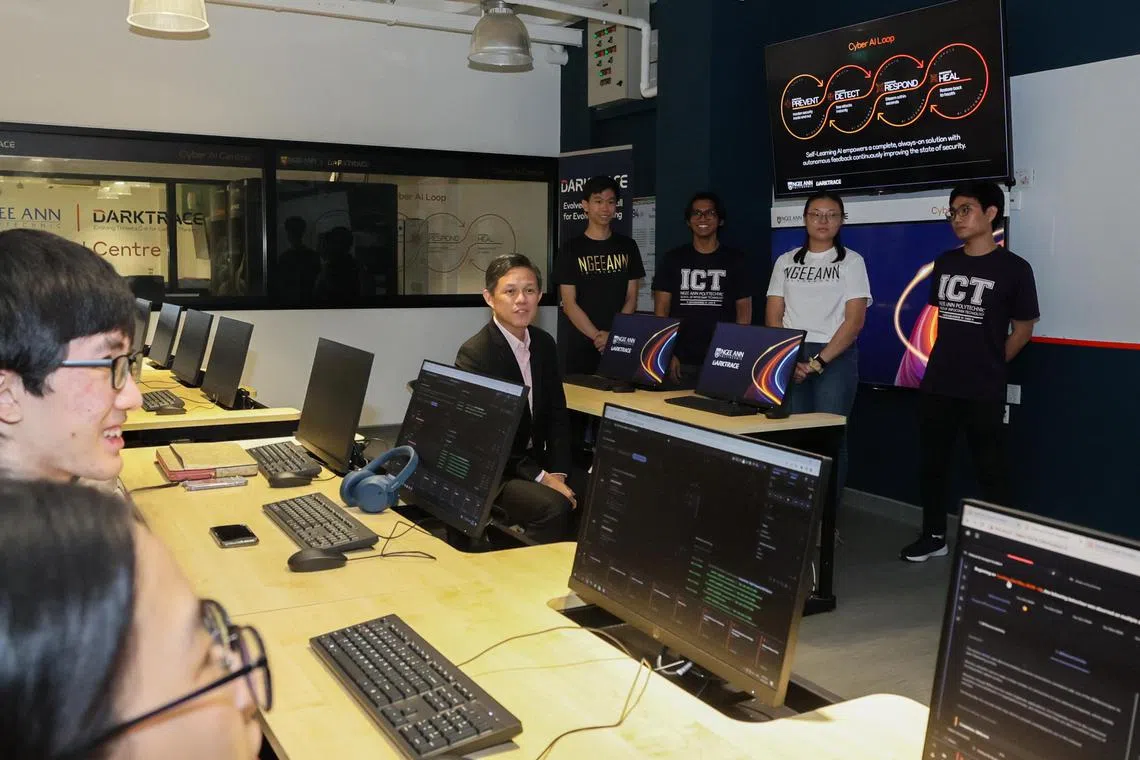More industry involvement in Ngee Ann Polytechnic’s diploma curriculum
Sign up now: Get ST's newsletters delivered to your inbox
![CMG20230524-LynnetteT02/卓祾祎/刘钰铃/Ngee Ann Polytechnic launches new Industry-in-Curriculum framework [Ngee Ann Polytechnic Convention Centre 535 Clementi Road, Singapore 599489] The Industry-in-Curriculum (IiC) framework, will groom graduates with in-demand skill sets and industry-validated competencies, will see at least one-third of the curriculum for all diplomas co-developed, co-delivered, and co-assessed by esteemed industry players. Graced by Minister for Education, Mr. Chan Chun Sing, the event will bring together over 100 partner-companies committed to nurturing next-gen talents. Experiential showcase at NP’s School of InfoComm Technology with industry partner Darktrace and participating students.](https://cassette.sphdigital.com.sg/image/straitstimes/cffe7f87041d1774b1108f708c2c3a893657787003661f1dd9a6173a0687cf28)
Wednesdays will be reserved for industry engagement and cross-disciplinary projects.
PHOTO: LIANHE ZAOBAO
SINGAPORE - All full-time diploma programmes at Ngee Ann Polytechnic (NP) will soon have industry partners involved in developing and delivering at least one-third of the curriculum, as part of a push for greater alignment of learning with industry demands.
The polytechnic piloted this model across seven diplomas in 2022, and full implementation for 36 diplomas will be completed by the end of 2024.
As part of this arrangement, students can undertake year-long internships, up from regular attachments lasting three to six months.
The polytechnic will also not schedule classes on Wednesdays, which will be reserved for industry engagement and cross-disciplinary projects.
The initiative, known as Wednesdays Without Walls, will allow students to get more involved in industry projects beyond their disciplines, while academic staff will have the space to work on industry-focused activities.
NP announced these moves on Wednesday as part of a new Industry-in-Curriculum framework, with the goal of equipping students with industry-relevant skills.
Students will have lessons designed by industry experts, plug into emerging trends and developments, and have their skills validated by practitioners. Some can also attain industry certifications as part of curriculum requirements.
More than 100 industry partners have committed to working with NP.
Speaking at the polytechnic’s Industry Partners Appreciation Day, Education Minister Chan Chun Sing said that having strong connections between institutes of higher learning (IHLs) and industry is important in ensuring Singapore’s continued competitiveness.
“In Singapore, we do not compete on the basis of our price or our size. But we compete on the basis of our speed of evolution. Whoever can best tighten the academia and industry nexus will be the winners in a fast-paced world.”
Making a case for more industry involvement with IHLs, Mr Chan said companies have first dibs on the talent pool. “When a student does an internship with a company, it is a process of mutual discovery.
“In Singapore’s talent-tight market, this is a crucial competitive advantage.”
Polytechnics can help to provide innovation as a service, he said, by brainstorming with companies on ways to meet business challenges.
“For every small and medium-sized enterprise, it is hard to have your own lab to do product development, research or even market testing,” he said.
“But if you partner our polytechnics and the Institute of Technical Education, you have a chance to do that.”

Education Minister Chan Chun Sing (centre) said that having strong connections between institutes of higher learning and industry is important in ensuring continued competitiveness.
PHOTO: LIANHE ZAOBAO
IHLs can also supply training for companies, he said. “In many industries, I can see many entrepreneurs wanting to train, upskill and reskill their workers. But every individual may not be able to articulate the demand for the new skills, what more the aggregation of demand for new skills.”
Mr Chan said that beyond its 4,200-strong intake each year, NP has a wide network of more than 170,000 alumni, which is a base of potential employees for companies.
The challenge for Singapore is to develop and retrain these adult workers, he said, adding that this constant upgrading of skills will enable Singapore to compete with other countries with more people and resources.
Under NP’s new model, existing modules will be refreshed and new ones added for more practical learning, while students will have more multidisciplinary projects based on real-world industry needs and will get their hands on emerging technologies and equipment.
Second-year cyber-security and digital forensics student Phoedora Liew, 17, attended a masterclass by trainers from cyber-security company Darktrace, where she got to see its real-time data at work and learn how to identify cyberthreats.
Longer internships are more beneficial, she said, as students can get a better sense of the work environment and how to apply concepts learnt in school.
“One worry my friends and I have is how much we can apply from what we have learnt in school to real life,” she added.
Mr Patrice Choong, NP’s senior director of technology, innovation and entrepreneurship, said the Wednesdays Without Walls initiative allows students and staff across disciplines to work together.
“What we realise is that the problems in industry cannot be solved by one school. They need people from business, information technology and design to solve it, but the curriculum timetable is a ‘prison’ because schools and students are bounded by it.
“The possibilities are greater just by freeing up this space in the timetable,” he added.



